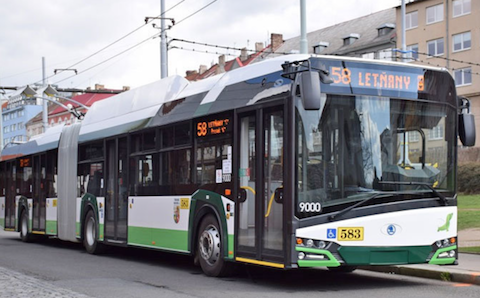 Abraham Lincoln
If given the truth, the people can be depended upon to meet any national crisis...
Abraham Lincoln
If given the truth, the people can be depended upon to meet any national crisis...
 Guildford news...
for Guildford people, brought to you by Guildford reporters - Guildford's own news service
Guildford news...
for Guildford people, brought to you by Guildford reporters - Guildford's own news service
Letter: Would A Trolleybus System Suit Guildford?
Published on: 18 Jan, 2020
Updated on: 18 Jan, 2020
From Harry Eve
In 1985, local firm Dennis, in conjunction with Alexander coachworks, built a prototype trolleybus based on their Dominator model.
 This was 13 years after the last UK trolleybus system closed down. Unfortunately, after trials, it was consigned to a museum near Doncaster, so perhaps the time was not right.
This was 13 years after the last UK trolleybus system closed down. Unfortunately, after trials, it was consigned to a museum near Doncaster, so perhaps the time was not right.
There are increasing concerns over the environmental damage that may be caused by the massive increase in demand for materials to manufacture batteries for electric vehicles.
It seems likely that buses will be mainly electric in the not too distant future and I wonder if we should be considering a trolleybus system for Guildford? This would remove the need for batteries where the route can run under wires.
A hybrid system might be possible with overhead wires, where bus frequency is highest, and a battery to keep the vehicle running on routes into more remote areas.
This should lead to extended battery life overall. It may be possible that the battery could be recharged while the bus continues running under the wires. This would reduce the time that the bus would need to spend in a depot.
In the old days the driver or conductor had to connect the trolley pole to the wires but convertible car drivers also had to open and close the hood themselves.
A better system involving an automated trolley pole that rises, or falls, and is guided on to the wires with no manual intervention must surely be possible now.

Trollybuses have been reintroduced in Prague. Image from Sustainable Bus website.
Responses to Letter: Would A Trolleybus System Suit Guildford?
Leave a Comment Cancel replyPlease see our comments policy. All comments are moderated and may take time to appear.

See Dragon story: GBC’s Explanation of Major Land Sale Notice Error ‘Borders on Arrogant’ Says Councillor




Recent Articles
- Notice: Exhibition – Ripley – World Famous Cycling Mecca
- Volunteer Organisers for the Poppy Appeal Urgently Needed
- ‘Damning’ Report Debated at Council Meeting – CEO Calls for Councillors to Come Together
- Surrey Children’s Services Improvement Recognised by Ofsted
- Independent Guildford Stationers Are ‘Top of the Shops’
- Birdwatcher’s Diary No.304
- Cyclist Dies in Peaslake
- Surviving Strategic Director Quits to Take Up CEO Role with a West Sussex Council
- Letter: Damning Reports Should Not Be Used to Gain Political Advantage
- New Leader of the Opposition at Waverley


Recent Comments
- Olly Azad on Mistreated Former Sub-postmasters Receive Standing Ovation
- Barry Jutsum on Letters, Comments, Complaints Policy and Privacy Statement
- Aubrey Leahy on Guildford Police Station to Close – Officers to Move to Mount Browne HQ
- John Ferns on Guildford Police Station to Close – Officers to Move to Mount Browne HQ
- Barry C Williams on Letter: Cross-party Effort Required to Improve Police Resourcing in Surrey
- Anthony Mallard on Guildford Police Station to Close – Officers to Move to Mount Browne HQ
Search in Site
Media Gallery
Dragon Interview: Local Artist Leaves Her Mark At One of England’s Most Historic Buildings
January 21, 2023 / No Comment / Read MoreDragon Interview: Lib Dem Planning Chair: ‘Current Policy Doesn’t Work for Local People’
January 19, 2023 / No Comment / Read MoreA3 Tunnel in Guildford ‘Necessary’ for New Homes, Says Guildford’s MP
January 10, 2023 / No Comment / Read More‘Madness’ for London Road Scheme to Go Ahead Against ‘Huge Opposition’, Says SCC Leader
January 6, 2023 / No Comment / Read MoreCouncillor’s Son Starts Campaign for More Consultation on North Street Plan
December 30, 2022 / No Comment / Read MoreCounty Council Climbs Down Over London Road Works – Further ‘Engagement’ Period Announced
December 14, 2022 / No Comment / Read MoreDragon Interview: GBC Reaction to the Government’s Expected Decision to Relax Housing Targets
December 7, 2022 / No Comment / Read MoreHow Can Our Town Centre Businesses Recover? Watch the Shop Front Debate
May 18, 2020 / No Comment / Read More






Bibhas Neogi
January 19, 2020 at 11:47 pm
Good idea but messes up the skyline over roads.
It is true that batteries for electric vehicles might cause worldwide mining issues and pollution, but there are other fuels that can replace petrol and diesel.
Please see the article in https://www.shell.co.uk/make-the-future/cleaner-mobility/the-great-travel-hack/season-one/fuels-vehicles.html#vanity-aHR0cHM6Ly93d3cuc2hlbGwuY28udWsvbWFrZS10aGUtZnV0dXJlL2NsZWFuZXItbW9iaWxpdHkvdGhlLWdyZWF0LXRyYXZlbC1oYWNrL3VzYS9mdWVscy1hbmQtdmVoaWNsZXMuaHRtbA
Using renewable energies, hydrogen can be produced in large quantities and also be compressed for storage at the pumps.
Technology is advancing but it will take time to shift away from fossil fuel engines.
Harry Eve
January 21, 2020 at 10:42 am
Bibhas Neogi is quite right that other solutions may become available that avoid batteries altogether and hydrogen fuel cell buses have been trialled around the world including in London.
Last year I saw a car with the same propulsion system parked near Abinger Hammer. But the widespread use of this approach still seems some way off.
The modern trolleybus solution (with in motion charging) offers a way of reducing battery use and is available now.
There are also numerous suggestions for alternative types of battery and some of these look promising but, again, they will take time to develop and make an impact (assuming they are actually achievable).
My personal view is that I would rather have wires over some roads (e.g. outside the Solum development) rather than polluted air in Guildford and widespread damage to the seabed environment.
Gordon Bridger
January 20, 2020 at 10:04 am
There is a simpler and more cost-effective solution to some of the solutions Mr Eve would like to see.
That is to introduce an electric shopper bus service.
While staying in Santa Barbara in California, I travelled around this attractive town in small 29-seater easy access buses which would be ideal for Guildford. Electric buses are remarkably cheap in the USA.
The solution Guildford Borough Council and Experience Guildford have sought to find a single operator through a bus organisation has not prospered, as costs by this system are understandably too high here.
My solution would be to share the costs between three organisations. The capital costs of buses to be funded via a 106 agreement with developers.
Maintenance and parking to be provided by GBC at its Woking Road depot, where the marginal costs of doing so would be minimal.
The third source of funding could be Experience Guildford, which is funded by a tax on shops which could be used to fund the driver and fuel.
This would be a really valuable visible role for EXperience Guildford to take over.
Jim Allen
January 21, 2020 at 9:46 am
I agree that smaller more frequent buses going to the right locations yet to be assessed is the best solution.
Something needs to be done, but Guildford Borough Council’s Woking Road depot will not be available [as within the Weyside Urban Village regeneration project], and part of the future problem not a cure for the current one.
Harry Eve
January 21, 2020 at 10:26 am
I do like Gordon Bridger’s suggestion and commented in favour at the time.
I see no reason why such a bus should not be a small modern trolleybus sharing a system to be used by other longer routes.
I have been researching the topic further and I hope to offer an update to The Guildford Dragon NEWS soon.
In the meantime I suggest taking a look at the link and photo that the editor found and kindly attached to my letter.
Sue Warner
January 20, 2020 at 4:45 pm
While it’s a nice idea, I don’t think it will resolve the traffic issues.
A lot of people driving in Guildford are travelling from one side to another to get elsewhere.
It would be nice if all the current buses could be gradually replaced with electric ones though.
Harry Eve
January 21, 2020 at 10:50 am
We will not resolve traffic issues without wider use of public transport for longer journeys. I will try to offer more on how a trolley system could help in due course.
Valerie Thompson
January 23, 2020 at 9:45 am
Trolley buses are not good idea. Better to provide trams with no overhead wires. Better still would be more small electric buses as others have suggested.
Editorial department replies: trams without overhead wires? They were when originally horse-drawn!. While click this link to read more. https://www.tramtalk.co.uk/single-post/2017/11/23/Tramways-without-overhead-wires
Harry Eve
January 24, 2020 at 9:56 am
The advantages and disadvantages of all systems should be considered.
Consideration should include the practicality of the infrastructure required and, given the climate emergency, the carbon emissions payback period (infrastructure provision also has a carbon cost).
Other indirect environmental issues should also come into it.
John Lomas
January 23, 2020 at 8:54 pm
Londons trams used overheads in the outer areas but in the central area they also used plough connectors.
Some trams were fitted with both systems so that their routes could extend out of the central area.
The central plough conduit can still be seen at the northern access of the Embankment to Kingsway tunnel.
https://tinyurl.com/Kingsway-Tunnel
Harry Elson
January 26, 2020 at 4:35 pm
Forget Guildford, the priority is a metro system between Guildford and Cranleigh using the old railway track – simple and cost effective.
With the Dunsfold building project now live and the ever expanding building in Cranleigh, someone will have to make decision on the infrastructure needed to relieve the huge growth in traffic using the already clogged roads into Guildford.
A huge reduction in carbon emissions would result.
Harry Eve
January 28, 2020 at 9:42 am
Has any progress been made on a public transport system from Cranleigh to Guildford ?
I am aware of a damaging road proposal in Shalford to accommodate the increase in private car use. But as Harry Elson states, the issue of what to do with the extra traffic when it reaches Guildford (or joins the back of a queue in Shalford) does not seem to have been addressed.
The carbon emissions saving from a metro system in the long run would have to be set against the emissions arising from the construction phase which could be very high.
Would the payback period be short enough given the Climate Emergency. Finally – how could anyone ‘forget’ Guildford!
Mat Huth
February 18, 2021 at 11:08 am
Give Guildford a transport system like one on Heathrow airport, an electric “smart” tram system. At the time of Covid it would be a good solution. Just imagine hundreds of small ~10 people trams around the town. They could be on the main streets from Cathedral to Merrow and from Bellfields to Shalford. Instead of heavy buses on the small roads.
https://en.m.wikipedia.org/wiki/ULTra_(rapid_transit)
Harry Eve
February 18, 2021 at 4:05 pm
Solutions like this are good. I think ultracapacitor solutions where the vehicle can recharge at a bus stop in the time it takes to load and unload passengers will make this much more feasible for in-town use. Solutions, where the recharging takes place from a device set in the road rather than using overhead paraphernalia, would also be good. The technology exists to make this possible but it still takes the will and money to actually do it.
Outside town, where the distance between stops is greater is more problematic.
Alistair Smith
February 19, 2021 at 5:04 pm
The technology to provide electric buses over a wide area is becoming available. It should be noted that if you can power buses directly from the mains it makes the bus more efficient and lighter. The Guildford Society posted an item in January on the experience from Zurich https://www.guildfordsociety.org.uk/TrolleybusZurich.html
Alistair Smith is the chair of the Guildford Society